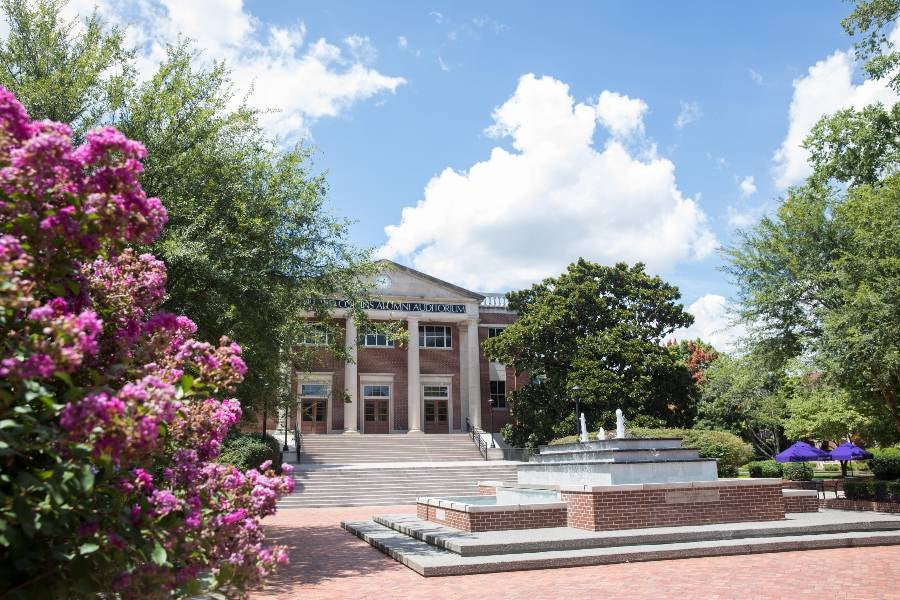Lipscomb receives $1.65 million grant to develop mental health training to meet needs in Middle Tennessee
Grant will fund new training program to address unmet mental health, substance use disorder needs with a focus on youth
Kim Chaudoin |

Lipscomb University’s Clinical Mental Health Counseling Program (CMHC) has been awarded a $1.66 million grant from the Health Resources and Services Administration (HRSA), an agency of the U.S. Department of Health and Human Services, to improve mental health services in Middle Tennessee by training the behavioral health and healthcare workforce to address unmet needs.
This grant will fund Lipscomb’s new Healthcare Professionals Certificate Training (HPCT) program and will provide full tuition for a total of 50 students to complete a graduate Certificate in Substance Use Disorder Treatment.
“Through this grant we will equip professionals with the tools they need to make an impact in this critical area of mental health care,” said DeAndrea N. Witherspoon Nash, director of Lipscomb’s Clinical Mental Health Counseling Program, lead faculty for the CMHC addiction specialization and director of the new program. “I am thankful that through this grant we will increase the number of mental health and healthcare practitioners providing mental health support as well as substance use disorder prevention, treatment and recovery service. This is an important way we can serve the Nashville community and make a positive impact on the lives of those who need these services the most.”

DeAndrea N. Witherspoon Nash
The Healthcare Professionals Certificate Training program will prepare trainees to address the unmet co-occuring mental health and substance use disorder needs of underserved and vulnerable individuals in comprehensive health centers, with a focus on children, adolescents and the emerging adult population in Middle Tennessee. It is designed for counselors, physician assistants, nurse practitioners, nurses and social workers practicing at partnering Federally Qualified Health Centers (FQHCs) offering substance use disorder treatments for underserved populations.
The new program will provide much needed training to serve a growing need in the community by practitioners in some of the most rapidly growing fields. According to a 2022 Centers for Disease Control and Prevention report, Tennessee observed an overdose mortality rate of 45.6 per 100,000 persons in 2020, which, based on the total state population, totaled 3,034 deaths.
Last year, 7.2% of Tennessee’s adult population and 4% of its youth population (12-17 years of age) were diagnosed with substance use disorder (SUD) and nationally, Tennessee ranked eighth highest in rates of youth with alcohol dependence and illicit drug use according to 2018 Mental Health America data. In Davidson and its contiguous counties, 9.3% of individuals 12 years and older were diagnosed with SUD, at a total of around 111,000 persons (SAMHSA, 2021). In Davidson County specifically, there was a 31.8% increase in fatal drug overdoses and a 40.4% increase in nonfatal overdoses from 2019 to 2020 according to a 2021 Metro Public Health Department of Nashville/Davidson County, Tennessee.
The certificate program may be completed in a one-year, three-course substance addiction specialization curriculum within a CACREP-accredited clinical mental health counseling program. In addition, participants will enroll in two group supervision courses led by an instructor. Group supervision will occur concurrently with the summer and fall courses. The first cohort of 10 practitioners will begin the program in January 2024.
It is an enhancement of Lipscomb’s Master of Science in Clinical Mental Health Counseling addiction specialization which is the only faith-based, CACREP-accredited university in the south that offers this unique program and equips students with the knowledge and expertise that make a difference on the front-lines of treating those with a substance use disorder. In addition, Witherspoon Nash said the grant will fund the development of a Mental Health and Substance Use Disorder Treatment and Prevention conference for trainees as well as to develop other professional development programming for practitioners.
This is the fourth HRSA grant awarded to Lipscomb, all of which have been for programs developed by the Department of Psychology, Counseling and Family Sciences, housed in the College of Liberal Arts & Sciences.
Since 2017, the department has been awarded $3.56 million in grants based on project proposals developed by Douglas Ribeiro, director of graduate counseling and chair of the Department of Psychology, Counseling and Family Science. Ribeiro’s proposals established Lipscomb’s Behavioral Health Initiative to train the behavioral health and education workforce for an integrated approach to meeting mental health needs.
Because of his familiarity with the process, his eye was drawn to the opportunity, knowing that Witherspoon Nash would make an excellent principal investigator for the grant-funded program. He brought his expertise and local health care connections to bear on the proposal writing team of Witherspoon-Nash and Robyn Saakian, Director of the Office of Research & Grants.
This new HRSA award will be administered by Witherspoon Nash. The program is 100% financed with federal funds in the amount of $1,654,121 for the five-year initiative. No funding is financed by non-governmental sources. With this latest award, the department has secured $5.2 million in federal funding over the last six years.
Lipscomb University’s Department of Psychology, Counseling and Family Science offers undergraduate programs in psychology and family science as well as graduate programs in clinical mental health counseling, psychology and marriage and family therapy. For more information, visit www.lipscomb.edu/psychology.
The Healthcare Professionals Certificate Training program is supported by the Health Resources and Services Administration (HRSA) of the United States (U.S.) Department of Health and Human Services (HHS) under the grant number T62HP49315 as part of an award totaling $1,662,693 with 100 percent funded by HRSA/HHS and no dollars financed by non-governmental sources. The contents are those of the author(s) and do not necessarily represent the official views of, nor an endorsement, by HRSA/HHS, or the U.S. Government. For more information, please visit the HRSA website.